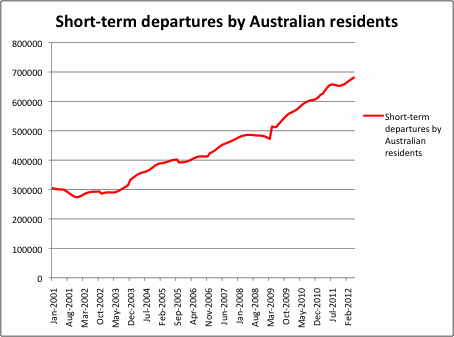Many Australians are, they are convinced, doing it tough. Surging prices making life difficult when it comes to the weekly shopping. Constantly rising electricity costs make each power bill a hammer blow. No one’s benefiting from the mining boom. The Aussie dollar is killing our manufacturing sector. The sharemarket keeps weighing down our super. On it goes.
Except, it serves to pay attention to what Australians are doing, not what they’re telling pollsters and journalists. This graph is from today’s Australian Bureau of Statistics data on overseas arrivals and departures for the month of May.

It shows that, in trend terms, Australians are taking holidays overseas in their greatest numbers ever. In May, the number of short-term departures by Australians was the second-highest ever recorded in seasonally adjusted terms (second only to April last year) and the highest ever in trend terms.
The Aussie dollar, of course, can be held responsible for much of this surge. But for those of us old enough to remember when overseas holidays were the sort of exotic events that only happened a couple of times in a lifetime for most of us, it’s a telling sign of just how much travel costs have fallen and Australian incomes have risen in recent decades.
It also serves to illustrate — as the European Central Bank, the Bank of England and the People’s Bank of China all cut interest rates out of concerns about the global economy — how much Australia is, in the words of Glenn Dyer today, an outlier in the global economy, enjoying economic conditions and levels of income that are the envy of most other developed countries.
Yet still we continue to whinge about how tough we’re doing it. And our politicians rush to pander to our sense of economic victimhood.







Ypu would think all that oversea travel might open peoples eyes to just how lucky we have it here but alas it seems the case that they choose to complain they could only afford the 4 star hotel with a view of the carpark rather than how fortunate they are to have the opportunity in the first place.
It’s hard to say whether this piece is just dumb or….patronising.
Taking this single index of consumption proves what? That the middle class are holidaying abroad more often ?
And yes, we know it’s the dollar…
Of course Australia is relatively prosperous, for the time being. But to imagine that working and lower middle class people aren’t hurt by huge power price rises, unemployment, a dismal retail sector, etc. is smug.
Little inner-urban Crikey is often smug…
cheap airfares my friend … cheap airfares.
the same cheap airfares that are allowing millions of quite poor people travel at the moment.
i suggest you take some time sitting in one of the big hubs to observe ………
Whilst I agree with the message in this commentary, that we are in a far better place than a lot of the world’s economies, and tend to have almost laughable misconceptions about that, I do think it’s a fairly gross assumption to assume that the increase in short term departures represents simply an increase in holidaying and thus wellbeing of Australians.
I would suggest that possibly an important factor of the increase in total short term departures may in fact be commercial travel, due in part to the offshoring of manufacturing, as well as simply an increasingly connected business world.
Frank Campbell – Yes this is only one stat but find a stat that disproves the proposition. Interest rates are historically low, unemplyment historically low, wages growth is solid, inflation is low, economic growth is very good, the only economic data that isn’t good are the “confidence” related ones which again supports the article.
And “But to imagine that working and lower middle class people aren’t hurt by huge power price rises, unemployment, a dismal retail sector, etc. is smug.” and also an imagined reality. These lower and middle income people are now paying less tax, getting more govt assistance, paying lower interest rates, experiencing real wages growth and more of them are employed.